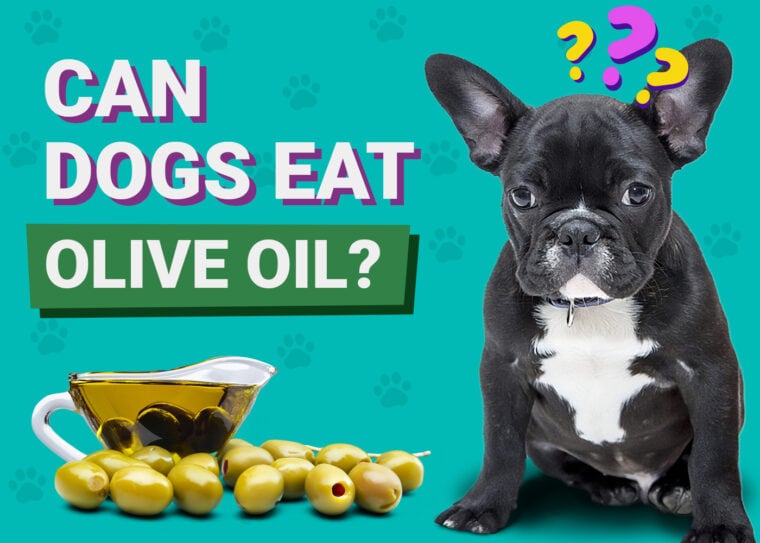
You might think of olive oil as a great option for priming a pan, or a nice topping on a salad, but what about giving some to your pet? It’s very important to understand what is healthy to give to your pet to avoid any illnesses or negative reactions. If you have a dog, you may wonder if olive oil has the same benefits for dogs as it does for humans.
Dogs can eat olive oil—but in moderation. When used properly, it can be a beneficial addition to their diet. Continue reading to learn about how olive oil can be good for your pup.
What Are the Benefits?
Olive oil can sometimes be used for improving skin health on humans, and in some instances, it can offer similar benefits to dogs as well. Dogs are unable to synthesize omega 3 and omega 6 fatty acids on their own, two fatty acids which contribute towards skin health (among other benefits). Canine diets that are based on meats naturally low in these fatty acids (such as diets based on beef or lamb) can therefore benefit from the addition of an ingredient like olive oil that supplements these fatty acids.
Olive oil contains vitamin E and fatty acids that act as a moisturizer for their skin. It can also benefit a dog’s fur in a similar way that it does for people by adding shine. Ozonated olive oil (which isn’t meant for consumption) has shown to be effective in dealing with skin ailments when applied topically. Studies on canine skin models (not on actual dogs) using olive oil have demonstrated some promising results.
However, edible olive oil isn’t a miracle cure for a dog with itchy skin. In experimental circumstances, dogs with itchy skin did not benefit from olive oil supplemented into their diet. Therefore, if your dog’s skin looks lackluster, or if your dog appears itchy, you should consult with your veterinarian before attempting to supplement their diet.

An additional benefit of olive oil in dog’s food is can boost their overall health. A controlled study 1 on olive oil supplementation in dog diets revealed that dogs showed better protein metabolism with the addition of olive oil into their diet. The same study observed that sunflower oil didn’t offer similar results, hinting that olive oil is likely a better oil to add into your pup’s diet. Though the dogs in the study didn’t have any adverse effects on their weight during the experiment, it is important to consider that they were young, newly weaned puppies with a much higher metabolic rate than an adult dog.
Another study with olive oil supplementation into a growing puppy’s diet also found similar results 2. Results showed that puppies that were offered diets supplemented with olive oil had different fatty acid profiles, but no adverse weight gain, and they grew at the same rate as other puppies. This study concluded that these oils might be a healthy addition to a growing puppy’s diet when offered in moderation.
In both these studies, there were no adverse effects on the fecal output of the puppies when the portion of olive oil offered to them was controlled.
Olive oil may also be gentle on a pup’s tummy. In studies for potential laxatives for dogs, olive oil is sometimes used (in appropriate amounts) because of its relative safety for a dog’s tummy when incorporated into their diet.
Can You Give Your Dog Too Much?
It’s important to slowly introduce something new to your dog’s diet.
Amounts of olive oil administered to dogs in studies, such as the ones mentioned above, are often quite minimal. It’s difficult to give a teaspoon or tablespoon equivalent for your pup, as dogs come in various sizes. In most cases, a teaspoon is excessive.
For example, a very large dog, such as a Saint Bernard can weigh up to 80 kg (176 lbs). For a dog of this size, half a teaspoon of olive oil added into their diet once per 2-3 days is considered sufficient. Smaller dogs need considerably less amounts of olive oil in their diet; a drop or two should suffice.

Olive oil is a natural fat, therefore, is inherently calorie-dense. Though proven to be useful in some experimental circumstances, it is important to note that a caloric surplus in your dog’s diet will inevitably lead to weight gain. Though being overweight isn’t a disease in itself, excess weight associated with obesity can be a precursor for many other ailments and disease. Fat cells inherently produce lectin, a hormone which can cause persistent, chronic, low grade inflammation all over your dog’s body.
To avoid giving your dog too much olive oil, it’s best to work closely with your vet in order to formulate a meal plan that’s suitable for your pup. Remember that your dog’s nutritional needs wont stay consistent either and can change throughout their lives.
Final Thoughts: Tips for a Healthy Diet
Olive oil is safe for dogs, and in experimental circumstances has shown to offer some benefits. However, portion control is key, and overfeeding olive oil will likely not offer any benefits at all. Keep note that your dog requires many other vitamins and nutrients to maintain an overall healthy diet. Research any breed-specific requirements that may be present and remember that your dog shouldn’t get too many treats or have too many changes in their diet (unless recommended by a veterinarian).
Don’t overload their daily meals with olive oil and keep an eye out for any changes in their behavior or signs of an upset stomach. Always reach out to your veterinarian for advice and guidance whenever in doubt about your dog’s diet.
See also:
- Can Dogs Eat Vegetable Oil? Vet-Reviewed Facts & FAQ
- Can Dogs Eat Parmesan Cheese? Vet Approved Facts & FAQ
Featured Image Credit: HomeMaker, Pixabay








